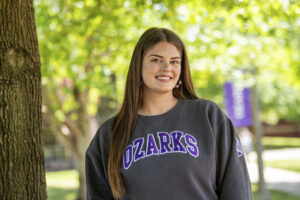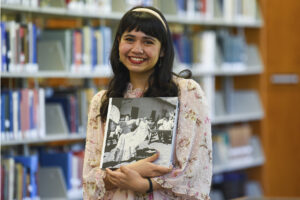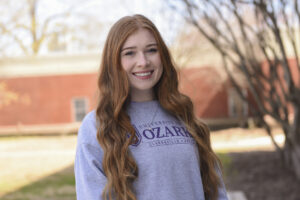As a student in the University of the Ozarks psychology program, you will learn the traditional theoretical, empirical, and applied areas of psychology. We will offer you opportunities to enrich your understanding of behavior, cognition and emotions through collaboration with faculty on research projects, as well as applying your understanding though service experiences in the community. We will prepare you to meet the academic standards required for graduate work in any number of areas (counseling/clinical, social work, neuroscience, etc.). A bachelor's degree in Psychology also provides a foundation to thrive in a number of areas of work and life such as: business, teaching, healthcare, coaching, family dynamics, relationships and ethical decision making.
Degree Outcomes
Students receive orientation, training and education in the Scientist Practitioner model of psychology proposed by the American Psychological Association.
Students develop research and practice skills to prepare them for graduate school in psychology, education, clinical/counseling settings and neuropsychology.
Students develop a better understanding of the relationship between their intrapersonal and interpersonal adjustments in their personal lives and work goals.
The field of mathematics opens up a wealth of opportunities in a wide variety of professional and career paths for students. The faculty members of the Mathematics Department at the University of the Ozarks provide innovative, high quality instruction to their students. The excellent student-to-teacher ratio allows personalized instruction with individualized attention in order to better equip students with the necessary skills and abilities to succeed in their chosen careers. The progression of courses consists of a well-planned mixture of pure and applied mathematics to give a broader and deeper understanding of the discipline of mathematics. Some of our students tailor their career goals by the addition of a second major and/or minor(s). This would be an attractive option in fields such as biostatistics, financial management, analysis, and statistics, among others.
Degree Outcomes
Graduates are pursuing careers in industry, government, insurance, banking, software development, and financial management.
Students are entering the teaching field in mathematics education after graduation.
Students pursue graduate school for engineering, computer science, mathematics teaching at a college level, or mathematical research.
“Anything that can be touched, tasted, smelled, seen or felt is made of chemicals and chemists are the people who transform the everyday materials around us into amazing things.”
American Chemical Society (ACS)
The term chemistry is not only limited into beakers and laboratories. It is all around us, and it is in our daily lives. Everything you hear, see, smell, taste, and touch involves series of chemical reactions and interactions in our body. Since ancient time, whether we realize it or not, chemistry has influenced the life of everyone. Why the sky is blue, why we cry when we cut onion, why coffee keeps us awake, and what happens when we fall in love are some of the examples of how chemistry affects our lives as human beings. The more we understand about chemistry in our lives, the better we know our world. If you are curious about the different natures of chemical compounds and their application in real life, major in chemistry!
Training in chemistry blends descriptive, conceptual, and mathematical elements in both lectures and laboratory work. The chemistry program at Ozarks offers students the opportunity to develop not only their chemical knowledge that are central to physical, chemical, and biological nature, but also to sharpen their analytical ability. Our program gives our students an opportunity to study the five areas of chemistry: analytical, inorganic, organic, physical, and biochemistry. These areas provide a unique perspective into chemical problems which will coalesce into a deeper understanding of the chemical world. Courses are a mixture of lecture material and laboratory experience which will combine qualitative and quantitative analysis to solve problems.
Degree Outcomes
Students will have opportunities to work on undergraduate research projects directly with their professors.
The program prepares students to thrive in various career paths, including health and pharmacy.
Students will also be prepared to thrive in research and development, and academia fields.
A doctor, a state wildlife manager, and a high school biology teacher are all applied scientists and initially trained as scientists. While “science” includes what we already know, we think it is even more about what we do and how we do it. In that light, we designed the Biology Major curriculum first to help students to explore the diversity of life and how life works, and to discover how the scientific approach provides reliable, trustworthy explanations. In the first four semesters, you will choose three of 6-8 courses from genes to ecosystems. Next, you will focus on courses geared toward your career goals by choosing courses in one of three tracks: Biomedical and Pre-professional, Ecology and Wildlife Biology, or Secondary Education. Finally, the biology faculty will help you to do the science—in a research project, internship or by shadowing a professional in the workplace.
Degree Outcomes
Professional School for Medical, Veterinary, Dental, Pharmacy.
Graduate Studies in Genetics, Fisheries, Plant Science, Agricultural Entomology, Marine Biology, Microbiology, Ecology and Physiology.
Careers as State or Federal Wildlife Biologist, Hospital or Veterinary Laboratory Technician, Winery/Brewery or Microbiologist.
Sociology is the study of human social relationships and institutions. Sociology’s subject matter is as diverse as the subject it studies. Students who have been well trained in sociology know how to think critically about human social life and how to ask important research questions. Through its particular perspective, its social theories, and research methods, sociology increases awareness and analysis of the human social relationships, cultures, and institutions. Students trained in sociology have learned how to think, how to evaluate, and how to communicate effectively. These are all valuable abilities in a wide variety of vocations and professions. More specifically, a degree in sociology can qualify you for a career in human services administration, counseling, journalism, public office, law enforcement, corrections, social work or education. Sociology also provides a foundation for graduate study in theology, political science, the medical sciences, the arts, the humanities, and the service professions, as well as graduate study in sociology.
Degree Outcomes
Students learn the sociological perspective.
Students learn social theories and research methods.
Students learn to engage in the analysis of the human social culture.
Studying Political Science at University of the Ozarks will provide students with an opportunity to develop an in depth understanding of the institutions, practices and concepts that shape the world around them. Whether they are interested in American politics, International Relations, or the foundations of US law, Political Science students at U of O will work closely with dedicated faculty in a friendly but challenging environment where than will cultivate an ability to critically engage with important political questions and problems. The program is focused on providing students with practical experience and insights into politics, and has a range of opportunities for students that include Moot Court and Model UN programs, and support for students to pursue internships in government at the local, state, and national level.
Degree Outcomes
A Political Science degree is excellent preparation for law school or graduate school in public policy or political science.
Political Science majors go on to careers in government, media and business where they can apply their knowledge of political issues and institutions to work on policy, inform and educate the public, and help develop successful business strategies.
Internship opportunities supported by U of O Political Science help students gain the experience they need to work on political campaigns or get jobs in the public sector after they graduate.
Physical Education majors at Ozarks learn how to become advocates for the public’s health through an important and ongoing study of behaviors associated with adopting an active lifestyle. By learning to apply methods for teaching and learning, Ozarks physical education majors help to explain the reciprocal relationship between physical activity, fitness, and health in an effort to reduce the risks associated with hypokinetic disease. To meet the significant challenges and opportunities related to active living within the American culture today, the physical education major at Ozarks offers instruction in many areas of the health sciences including: kinesiology, exercise physiology, health education, public health promotion, coaching athletics, administration of sport, physical education curriculum design for schools, and methods for teaching physical education programming. Completion of the physical education program of study will lead to a teaching license in Arkansas public schools for K-12 grades, and also provides opportunities for coaching athletics.
Degree Outcomes
Students become licensed physical educators.
Students pursue athletic coaching.
Students enroll in graduate programs.
Teacher candidates that complete all of the required components of the Pat Walker Teacher Education Program will be eligible for an Arkansas teaching license at the end of their program of study. Our program will not align with the teacher certification licensure requirements of other states. Graduating from the University of the Ozarks Teacher Education Program will not automatically qualify program completers to receive a teaching license in another state. Teacher candidates and program completers will want to consult the Department of Education website of their preferred state in order to examine educator licensure and reciprocity requirements should they seek licensure in a state outside of Arkansas. Foundations of Reading Information
Elementary Education majors at Ozarks are engaged in important discussions about the role of the public schools in producing educated citizens, and address the question, “What is the proper education of the people?” Elementary teachers form the foundation of that proper education, so our majors display competency in many content areas including literacy, language, life science, physical science, mathematics, fine arts, psychology, and computer science. Ozarks elementary education majors understand how the information to be learned in those content areas can be deployed through a host of methods and strategies grounded in theoretical and philosophical constructs from a knowledge base that all students in the classroom learn through different styles and at different rates.
Degree Outcomes
The majority of our students become practicing teachers in both public and private K-6 classrooms in the United States and abroad.
Students pursue Master’s in Teaching programs, preparing themselves for careers in administration, curriculum specialists, and college professors.
Students are also valued by professions in business, government, and other education related fields.
Teacher candidates that complete all of the required components of the Pat Walker Teacher Education Program will be eligible for an Arkansas teaching license at the end of their program of study. Our program will not align with the teacher certification licensure requirements of other states. Graduating from the University of the Ozarks Teacher Education Program will not automatically qualify program completers to receive a teaching license in another state. Teacher candidates and program completers will want to consult the Department of Education website of their preferred state in order to examine educator licensure and reciprocity requirements should they seek licensure in a state outside of Arkansas. Foundations of Reading Information
Accounting is frequently described as a field in which the demand for graduates is more than the supply can deliver. Department of Labor projections, surveys and polls by both the popular press and business-oriented press, and college career planning guides and websites consistently recommend accounting as a major where the demand for graduates is generally stable and salaries are competitive. A primary goal of the program is to satisfy the academic requirements for students to sit for the Certified Public Accountant (CPA) exam upon graduation. In many states, including Arkansas, graduates may sit for the exam with 120 semester hours, although all states require that practitioners have 150 semester hours to be eligible to receive the Certificate and Permit to Practice.
Jobs available to recipients of this degree include work as public accountants and auditors, governmental accounting and auditing, tax accountants and preparers, internal auditors, corporate accounting, corporate controllers, and other positions with a financial emphasis. Some of these positions will require specialized training beyond the bachelor’s and master’s level.
Degree Outcomes
Students will acquire an understanding of the importance of accounting which is critical in the writing of grants.
Students can function as financial reporting and cost accountants, with different specialties depending on the size of the organization.
Students have the foundational knowledge and skills to enable them to better prepare for the Certified Public Accountant examination.
University of the Ozarks Theatre is centered on the core belief that by conducting ourselves with professionalism during our rehearsals, labs, projects, classes, and internships, we will achieve success both here in our program and onward in the professional world. We seek to educate students in all aspects of the theatrical arts. Analytical skills, problem solving, and cooperative endeavors are promoted through the creative and collaborative process of theatre productions.
Degree Outcomes
Graduate/ Professional Programs
Professional and Local Theatres
Teaching and Art Administration
PERFORMING ARTS SCHOLARSHIP
Students pursuing a major or minor in Theatre have the opportunity to compete for performing arts scholarships ranging up to $5,000 per year. This scholarship can stack on top of institutional scholarships and grants up to full tuition and are renewable for four years. Application deadlines are April 15th for the fall semester and December 1st for the spring semester.
Find out more information!













